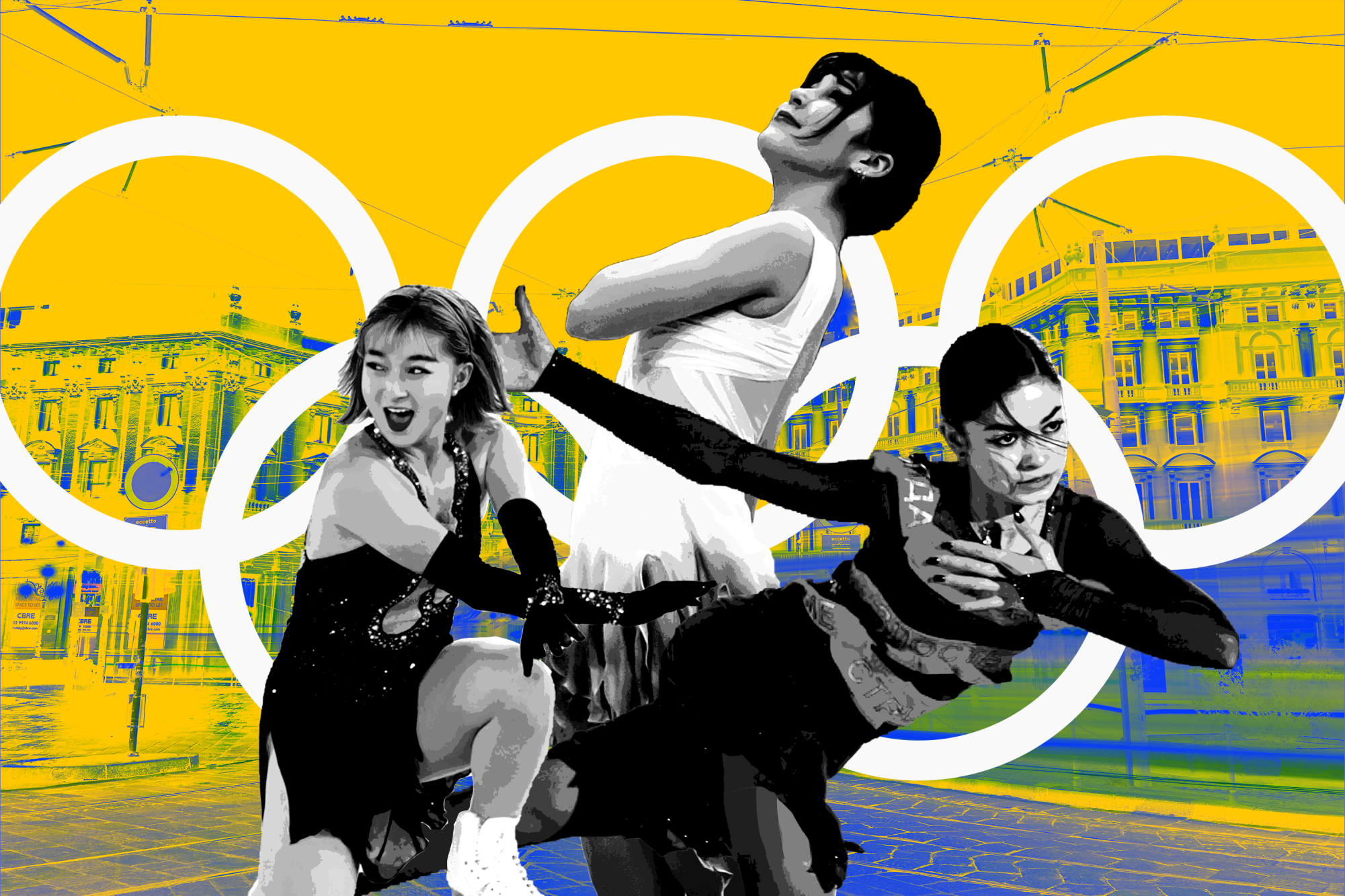Disclaimer: Some of the quotes within this article are translated from Russian to English.
The 2022 Olympic figure skating event remains difficult to recount. 15-year old Kamila Valieva, student of Russia’s most powerful coach, Eteri Tutberidze, failed a doping test, setting off a chain of controversy. The fallout included emotional breakdowns from all three Russian women’s competitors and a tepid reaction from Tutberidze herself that International Olympic Committee President Thomas Bach describes as leaving him “very disturbed.” Finally, the Russian invasion of Ukraine marked the nation’s third consecutive violation of the Olympic Truce.
The result: Russia was swiftly banned from international sport.
For the first time since 2022, Russian skaters will compete internationally at the Skate to Milano Figure Skating Qualifier in Beijing, Sept. 17-21. The International Skating Union announced earlier this year that Russia would have the opportunity to nominate two athletes or teams—one primary and one substitute—in each of skating’s four disciplines to be vetted for neutrality and the chance to earn a berth to the Olympic Games. The rules, however, are unforgiving. If any athlete fails the vetting process, they will not be reconsidered, and their substitute is automatically disqualified. And, if an athlete qualifies at the Beijing event, their substitute can no longer replace them, even in cases of injury.
Russia has long been a skating powerhouse, placing teams atop the Olympic podium for over 40 years and winning 7 of the 13 ice dance events. Lately, Russian women have achieved phenomenal success under Tutberidze, with gold medals at the past three Olympics and placing 1-2 at the last two Games.
These victories come at a cost. Tutberidze’s training methods prioritize extremely light, prepubescent bodies capable of difficult jump content at the cost of health and longevity. 2018 Olympic silver medalist Evgenia Medvedeva recently said she skated at the Games with a leg bone that was “crumbled” and osteoporosis that made her skeleton close to what “elderly women have at 85 years old.” While harsh coaching practices exist across borders, Tutberidze’s methods stand out as both particularly extreme and particularly rewarded, netting her the ISU Coach of the Year award in 2020. However, in Russia’s recent absence from competition, the women’s and pairs’ fields have seen reduced technical content but a transformed culture at the sport’s elite level.
Alysa Liu, for example, came back from her two-year retirement last season and became the first American woman to win the World Championships in 19 years and the youngest ever US National champion. Liu retired at 16 after the 2022 Games due to burnout, admitting she grew to hate the sport.
“When everyone wants you to win gold and all you want to do is be with your friends and family, it’s really hard because you’re doing something not for yourself,” Liu said in a 2025 interview with CNN Sports.
Liu enrolled in UCLA and took time off to be a normal teenager. She rediscovered her love of the sport during an impromptu skiing trip. She decided to compete in the 2024-25 season, struggling with stamina early on but pulling it together with a national silver medal that qualified her for the World Championships in Boston. There, Liu delivered two triumphant, transcendent performances set to music by Laufey and Donna Summer.
Alongside Liu, three-time World champion Kaori Sakamoto of Japan took silver in Boston, a trailblazer in her own right. Last March, the 24 year old became the first woman in 56 years to win three consecutive World titles. With some of the most powerful skating skills in any discipline, Sakamoto has stood in stark contrast to the oeuvre of the Russian women’s program since she won Olympic bronze in Beijing with a program aptly titled “I Am a Woman.” A viral clip of Sakamoto and Liu embracing in tears of joy after the latter’s win, too, feels like a repudiation of the 2022 podium.
While Liu and Sakamoto are favorites for the gold in Milano Cortina, the potential Russian qualifier in women’s singles marks a huge unknown. Though Russia’s nominees for pairs and ice dance were disqualified for pro-war activities, Russian national champion Petr Gummenik and Eteri Tutberidze’s latest wunderkind, Adelia Petrosian, were approved to compete as neutral athletes in men’s and women’s respectively.
Coming into the Olympic qualifier, Petrosian has marks both for and against her. She’s got an otherworldly technical arsenal, the only senior-eligible skater to land a quadruple jump and a triple axel in the 2024-2025 season. Her highest credited base technical score last season was 116.58 (Liu’s World championship-winning skates, without either element, were valued more than 20 points lower at 95.93).
But Tutberidze’s dominance stretches beyond difficulty. Her camp’s champion-level reputation creates arguably inflated presentation and execution scores. At the Beijing women’s short program, Valieva scored nearly 10 points higher than Japanese skater Wakaba Higuchi despite far inferior technical quality—Valieva stepped out of her triple axel while Higuchi nailed hers.
On the flip side, Petrosian would be the oldest Russian Olympic champion, just four months shy of 19 by Milano Cortina. Due to the age minimum increase brought on after the Valieva controversy, Tutberidze’s camp has had to train athletes to peak at 17 or 18 rather than 15, a feat that might be easier said than done. Elizabet Tursynbaeva is the oldest Tutberidze skater to have won a major international medal, a World silver at 19, but then struggled to recreate that success for two years before retiring due to a nagging back injury.
Petrosian will also have to adapt to both stricter judging and competition pressure, having only entered junior-level events before the ban. After the Beijing qualifier, the Olympic Winter Games would be only the second senior international competition of Petrosian’s entire life.
In many ways, the upcoming Games feels like a crossroads for the sport, and especially the women’s discipline. The Beijing Olympics was, for better or worse, the embodiment of figure skating’s Russian status quo. Only time will tell what choice is made in Milano Cortina.



